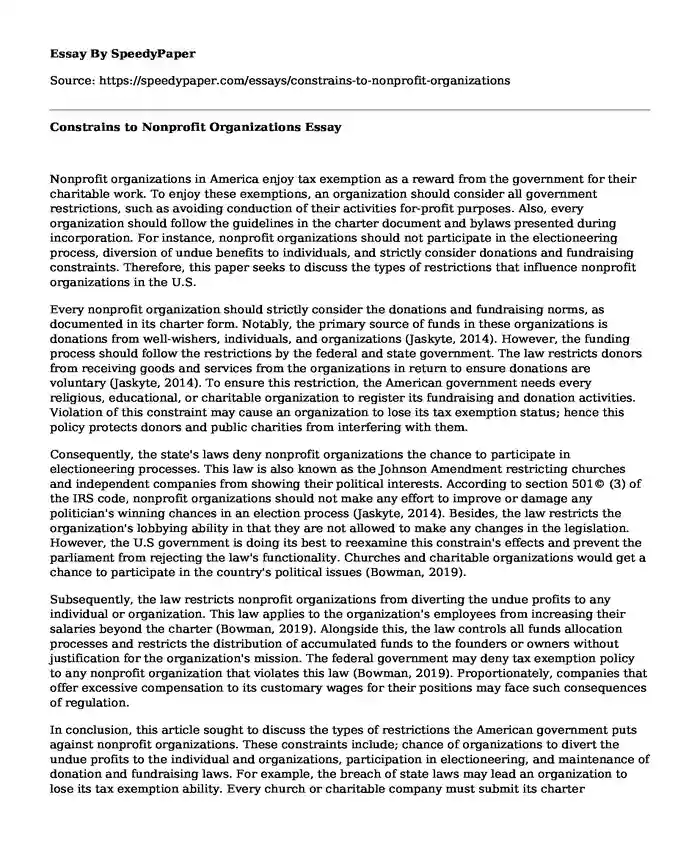
| Type of paper: | Essay |
| Categories: | Students Analysis Books Essays by pagecount |
| Pages: | 3 |
| Wordcount: | 622 words |
Nonprofit organizations in America enjoy tax exemption as a reward from the government for their charitable work. To enjoy these exemptions, an organization should consider all government restrictions, such as avoiding conduction of their activities for-profit purposes. Also, every organization should follow the guidelines in the charter document and bylaws presented during incorporation. For instance, nonprofit organizations should not participate in the electioneering process, diversion of undue benefits to individuals, and strictly consider donations and fundraising constraints. Therefore, this paper seeks to discuss the types of restrictions that influence nonprofit organizations in the U.S.
Every nonprofit organization should strictly consider the donations and fundraising norms, as documented in its charter form. Notably, the primary source of funds in these organizations is donations from well-wishers, individuals, and organizations (Jaskyte, 2014). However, the funding process should follow the restrictions by the federal and state government. The law restricts donors from receiving goods and services from the organizations in return to ensure donations are voluntary (Jaskyte, 2014). To ensure this restriction, the American government needs every religious, educational, or charitable organization to register its fundraising and donation activities. Violation of this constraint may cause an organization to lose its tax exemption status; hence this policy protects donors and public charities from interfering with them.
Consequently, the state's laws deny nonprofit organizations the chance to participate in electioneering processes. This law is also known as the Johnson Amendment restricting churches and independent companies from showing their political interests. According to section 501 (3) of the IRS code, nonprofit organizations should not make any effort to improve or damage any politician's winning chances in an election process (Jaskyte, 2014). Besides, the law restricts the organization's lobbying ability in that they are not allowed to make any changes in the legislation. However, the U.S government is doing its best to reexamine this constrain's effects and prevent the parliament from rejecting the law's functionality. Churches and charitable organizations would get a chance to participate in the country's political issues (Bowman, 2019).
Subsequently, the law restricts nonprofit organizations from diverting the undue profits to any individual or organization. This law applies to the organization's employees from increasing their salaries beyond the charter (Bowman, 2019). Alongside this, the law controls all funds allocation processes and restricts the distribution of accumulated funds to the founders or owners without justification for the organization's mission. The federal government may deny tax exemption policy to any nonprofit organization that violates this law (Bowman, 2019). Proportionately, companies that offer excessive compensation to its customary wages for their positions may face such consequences of regulation.
In conclusion, this article sought to discuss the types of restrictions the American government puts against nonprofit organizations. These constraints include; chance of organizations to divert the undue profits to the individual and organizations, participation in electioneering, and maintenance of donation and fundraising laws. For example, the breach of state laws may lead an organization to lose its tax exemption ability. Every church or charitable company must submit its charter containing all the agreement of functionality to the government through the board of directors or the attorney general. Thus, these constraints may be significant to the government functions in controlling nonprofit organizations and ensure legal and ethical practices. Despite these, the government should consider people and the organization's participation in political affairs to enhance human rights and freedom. In summary, this paper recommends that all organizations consider these restrictions to the latter to avoid the government's penalties.
References
Bowman, W. (2019). The economic value of volunteers to nonprofit organizations. Nonprofit Management And Leadership, 19(4), 491. https://doi.org/10.1002/nml.233Jaskyte, K. (2014). Board of Directors and Innovation in Nonprofit Organizations Model: Preliminary Evidence from Nonprofit Organizations in Developing Countries. VOLUNTAS: International Journal Of Voluntary And Nonprofit Organizations, 26(5), 1920. https://doi.org/10.1007/s11266-014-9505-7
Cite this page
Constrains to Nonprofit Organizations. (2023, Nov 25). Retrieved from https://speedypaper.com/essays/constrains-to-nonprofit-organizations
Request Removal
If you are the original author of this essay and no longer wish to have it published on the SpeedyPaper website, please click below to request its removal:
- Essay Sample: Autism Spectrum Disorder Industry Analysis
- Essay Example on Mass Shooting in America
- Essay Sample on Managing Diabetes
- Essay Example on "What Is Intersectionality and Why Do I Need It" by Ijeoma Oluo
- Essay Sample on Analysis of Jonathan Edwards' Sermon
- Paper Example on Nursing Impairment
- Christmas in Italy. Essay Sample
Popular categories




